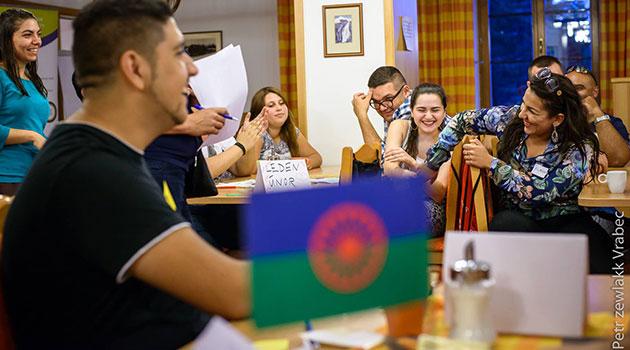Romani psychology student who is a ROMEA scholarship winner featured on Czech Television

“Our parents never went to college, but I was told I would go to college by them at home from an early age,” Roman Koky, a Romani student of psychology, says in a reportage produced by the “168 Hours” program on public broadcaster Czech Television. Along with his brother Michal, who is studying pharmacy, Roman Koky has attended a recent “Baruvas” (“We Are Growing”) meeting of Romani high school and college scholarship recipients.
The meeting was held at the end of August and start of September in the Krkonoše mountains by the ROMEA organization. “168 Hours” broadcast its reportage about the meeting last Sunday.
In his television interview Roman Koky is very clear about his professional future. He describes the motivation that led him to study psychology in particular at a university in Ostrava as follows: “This is mainly work that will make my life meaningful in the future, because I can aid others. I considered studying medicine, but psychology is, for me, beautiful mainly because it addresses the causes of behavior.”
Thanks to his study of psychology, Roman says he is acquiring deeper knowledge when it comes to the phenomenon of racism: “I already have a different perspective on racism after my first year of studying psychology. I don’t even consider it racism anymore as much as I consider it an error of social perception. I see that when the others get to know me, their view of Romani people is already better, because they say ‘Aha, you’re exceptional, you behave differently, others might be able to also’.”
Roman’s brother Michal is also in college. He chose to study pharmacy at the Veterinary and Pharmaceutical University in Brno.
“At college preparatory school I was inspired by chemistry and in elementary school I was in the first aid club. Pharmacy is a nice combination of chemistry and health care,” Michal explains.
“I can do it too!”
Monika Mihaličková, a fundraiser for the ROMEA organization, is also a psychologist by training. She is quoted in the “168 Hours” reportage about the importance of young Romani people being informed about the existence of the organization’s scholarship program.
“Naturally, this demonstrates to the students the possibility that if somebody else like them has achieved something, then they can achieve it also. I see that it’s realistic, that it’s not impossible – it’s something that I may not be involved with yet, but I could be involved with it if I decide to do something better with my life,” she explains.
At the end of August the meeting of almost 50 Romani college and high school students from all over the Czech Republic took place near Pec pod Sněžkou in the Krkonoše mountains. Its aim was to connect the students together, to support their efforts, and to motivate them to continue their education and personal development.
The number of Romani students at colleges and universities in the Czech Republic is continuing to grow in general, despite the fact that they must grapple with many barriers. The meeting was organized by the ROMEA public benefit corporation as a component of its “Baruvas” program (which means, in Romanes, “We Are Growing”), which is part of its Romani Scholarship Program.
Thematically, the meeting followed on from the previous regular student gathering, which was dedicated to self-presentation and the world of the media. Lecturers at that meeting included the sociologist Ivan Gabal, Czech Television reporter Richard Samko, and police officer Petr Torák, a Romani emigre from the Czech Republic now living in the UK who is a Member of the Most Excellent Order of the British Empire.
Ahead of this academic year ROMEA received more than 130 applications for scholarships. The organization currently only has the funding to support 60 students.
“We have accepted a challenge from the US-based Bader Philanthropies foundation thanks to which we will be able to support more students this year,” Mihaličková told Czech Television. “If we raise CZK 125 000 (EUR 4 800) by the end of September, the foundation will match that amount.”
“Let’s give a chance to more children and young people who want to study and grow,” she urged viewers. You can contribute to the scholarship program and aid Romani children with fulfilling their academic and professional dreams HERE.
